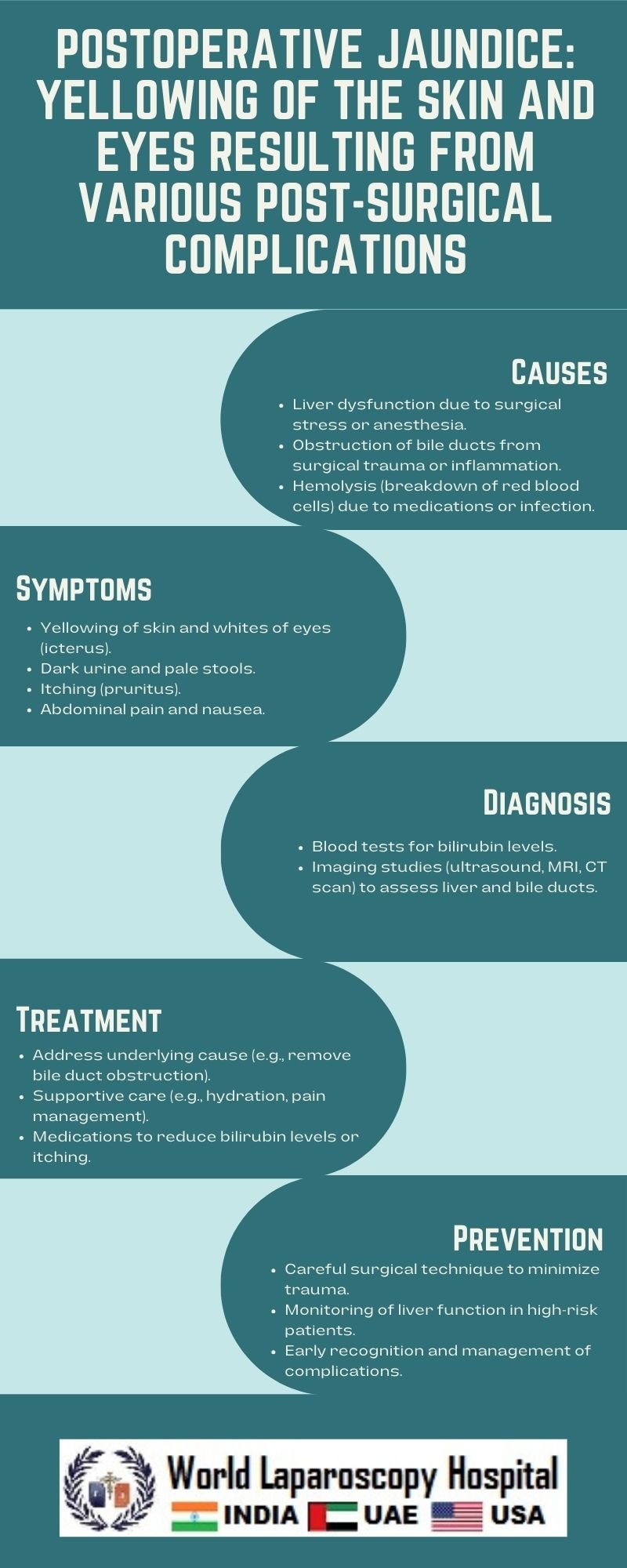Postoperative jaundice: Yellowing of the skin and eyes resulting from various post-surgical complications
Introduction
Postoperative jaundice is a condition characterized by the yellowing of the skin and eyes, typically occurring after surgery. It can be a result of various post-surgical complications, ranging from benign to life-threatening. Understanding the causes, symptoms, and treatment options for postoperative jaundice is crucial for healthcare professionals and patients alike.

Causes of Postoperative Jaundice There are several potential causes of postoperative jaundice, including:
Hemolysis:
This occurs when red blood cells are destroyed at a rate faster than they can be produced, leading to an increase in bilirubin levels in the blood.
Bile duct injury:
Damage to the bile ducts during surgery can lead to a blockage, preventing bile from flowing properly and causing jaundice.
Drug-induced liver injury:
Some medications used during or after surgery can cause liver damage, leading to jaundice.
Hepatic ischemia:
Reduced blood flow to the liver during surgery can cause liver damage and subsequent jaundice.
Choledocholithiasis:
The presence of gallstones in the bile ducts can cause a blockage, leading to jaundice.
Symptoms of Postoperative Jaundice The main symptom of postoperative jaundice is the yellowing of the skin and eyes. Other symptoms may include:
Dark urine:
Bilirubin in the urine can cause it to appear dark in color.
Postoperative jaundice:
Yellowing of the skin and eyes resulting from various post-surgical complications
The absence of bile in the stool can cause it to appear pale or clay-colored.
Itching:
Elevated levels of bilirubin in the blood can cause itching, known as pruritus.
Fatigue:
Jaundice can cause fatigue and weakness due to liver dysfunction.
Abdominal pain:
In cases of bile duct obstruction, abdominal pain may occur.
Treatment Options for Postoperative Jaundice The treatment of postoperative jaundice depends on the underlying cause. Some common treatment options include:
Observation:
In cases where jaundice is mild and resolves on its own, observation may be recommended.
Medications:
Medications may be prescribed to help reduce bilirubin levels or treat underlying liver conditions.
Surgery:
In cases where jaundice is caused by a bile duct obstruction, surgery may be necessary to remove the blockage.
Endoscopic retrograde cholangiopancreatography (ERCP):
This procedure can be used to remove gallstones or other blockages from the bile ducts.
Liver transplant:
In cases where jaundice is caused by severe liver damage, a liver transplant may be necessary.
Prevention of Postoperative Jaundice Preventing postoperative jaundice involves minimizing the risk factors associated with its development. Some preventive measures include:
Proper surgical technique:
Ensuring that surgeries are performed using proper techniques can help prevent bile duct injury and other complications.
Monitoring medications:
Healthcare professionals should monitor the use of medications that can cause liver damage and adjust dosages as necessary.
Postoperative care:
Providing appropriate postoperative care, including monitoring liver function and managing pain, can help prevent complications.
Managing underlying conditions:
Managing underlying conditions, such as gallstones or liver disease, can help prevent the development of jaundice.
Conclusion
Postoperative jaundice is a complex condition that can result from various post-surgical complications. Understanding the causes, symptoms, and treatment options for postoperative jaundice is essential for healthcare professionals and patients alike. By taking preventive measures and managing underlying conditions, the risk of postoperative jaundice can be minimized, leading to better outcomes for patients.
| Older Post | Home | Newer Post |

